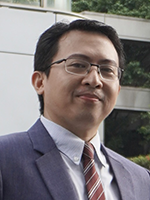ASEAN次世代専門家グループ招へい(第1期:経済安全保障)Aaron Jed Rabena

Aaron Jed Rabena(フィリピン)
フィリピン大学アジアセンター アシスタント・プロフェッサー
訪日レポート
I actually plan to publish as a commentary what I learned during the study tour. And I already made an initial presentation at Tokyo University on economic security. This is especially that not a lot of people in my country talk about or focus on economic security — and thanks to this Program of JF, I believe am off to a good start.
Japan can be said to be a pioneer on economic security given that it has established a ministerial office on the same in 2021. Although in 2018, during the first Trump Administration, the Trump Administration had already called “economic security” as “national security.” During the course of the study tour, I realized that understanding economic security is also about understanding a country’s sources of economic insecurity.
These factors of economic insecurity could include economic sanctions, industrial espionage, economic coercion, overdependence due to asymmetric relations, infiltration of strategic industries, cyber-attacks, and a country’s lack of development or position in the national hierarchy of needs.
To address these, certain policy tools are available for a state to pursue strategic autonomy. Consciousness of economic security is the first step, followed by policy measures. And these could be diversification/de-risking/decoupling, maintenance of competitiveness (industrial policy and support), and internal balancing.
While the Philippines can learn from Japan, there are both differences and convergence points. For example, there is a difference in terms of level of securitization as unlike Japan, the Philippines does not possess advanced or emerging technologies (industrial secrets, AI, quantum computing, drones, biotech, semiconductors), but there is a sense of alarmism against the takeover of strategic industries/sectors.
Yet, there are similarities in terms of concern for overdependence especially on China. For Japan, it is critical minerals; for the Philippines, it is trade, investments, tourism, ODA. Similarly, there is a shared goal for strategic autonomy and supply chain resilience.
The Philippines already has some consciousness of economic security. In the National Security Policy (2023-2028) of the Marcos Administration, the “national security interest” talks of “economic strength and solidarity” and the “national security agenda” highlights “economic, infrastructure, and financial security”, “energy security,” “transportation and port security.” The NSP notes the possible foreign control of critical and strategic infrastructures in information and communication or public utilities.
In this regard, the government will strengthen the review of foreign investments in cyber infrastructure, telecommunications, transportation. There was also a consideration of non-traditional security threats like climate change, diversification of food supply sources and energy sources. Airports, seaports and transportation systems are crucial due to their role in mobility and trade.
As far as internal balancing is concerned, the Philippines has the Philippine Development Plan (2023-2028). This speaks of the other factors that make the Philippines insecure in its desire to be a developed nation. Examples would be universal social protection, natural hazards and human-induced shocks, food resiliency and risks to vulnerable groups.
Notably, it’s not enough for Global South countries to be conscious about “economic security.” For third countries to be able to make insecure countries (Global South) secure, they need to double down on economic diplomacy and statecraft to provide economic carrots these said countries badly need. To sweeten packages, economic diplomacy needs to go hand-in-hand with public diplomacy. Southeast Asian countries or Global South countries will side with the country who can bring them economic benefits. Simply put, the level of priorities between developed and developing countries are different.
In the Philippines, it is important to start embedding economic consciousness of the Philippine policy community. Economic security needs to figure more prominently in bilateral/minilateral policy documents. Hedging against risks indeed need to be country-agnostic as were the cases of the China-US trade war and Covid-19 pandemic.
For its part, the Philippines needs to its homework on issues like ease of doing business and infrastructure otherwise courting investors or investment roadshows will only be lip service.
The Philippines and Japan – given similar level of political threats perceptions – can certainly enhance economic security cooperation and compare notes on investment screening processes, public-private partnerships, interest-lobbying groups, and commercial fifth columns. Clearly, interdependence is double-edged and has positive and negative aspects.
For the Philippines, it remains a challenge as to how companies and firms be convinced to accessing new markets as they mostly follow markets not politics. The Philippines’ critical minerals could be tapped by Japan for its strategic needs.
The Philippines’ Department of Foreign Affairs and DTI could also have economic security units. Finally, the Philippines should work towards the preservation of ASEAN centrality by supporting the deepening of its integration. Because if ASEAN is weak from within, it is more susceptible to control and domination by foreign powers.
